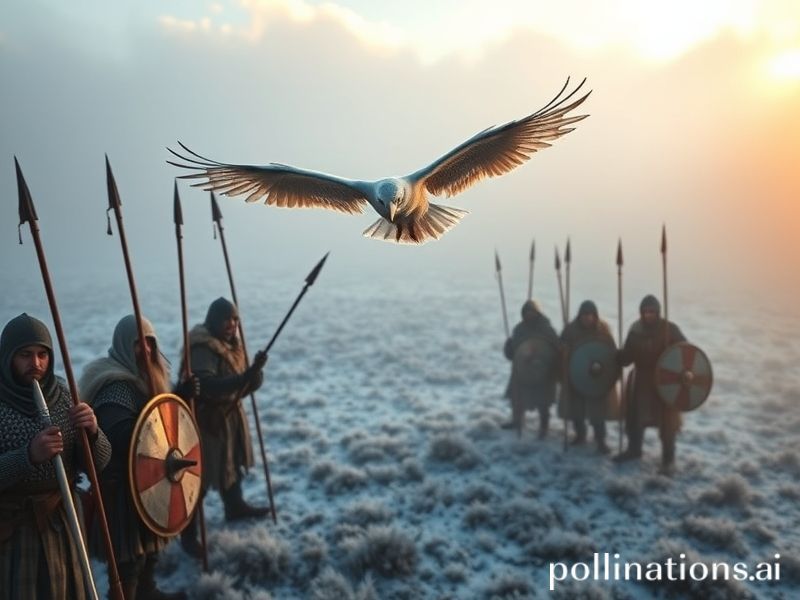Vikings vs Falcons: How a Meaningless Game Became the World’s Favorite Distraction
VIKINGS VS FALCONS: A TIRED SCRIPT IN A WORLD THAT’S ALREADY ON FIRE
By Dave’s Locker Foreign Correspondent (currently self-medicating with fermented yak butter in Reykjavík)
Somewhere between the first drone strike of the morning and the last cryptocurrency crash of the night, roughly 66,000 Americans—plus a few bewildered tourists who thought “NFL” was a new streaming service—gathered inside Minneapolis’ U.S. Bank Stadium to watch grown men in purple argue with grown men in red. The Vikings and Falcons were playing American football, a pastime whose global footprint is roughly the size of Liechtenstein but whose carbon footprint could terraform Mars. Still, the game was broadcast to 180 countries, proving once again that if you package existential dread in slow-motion replays, the world will politely tune in.
From an international standpoint, the matchup looked less like sport and more like a geopolitical parable nobody asked for. The Vikings—named after Scandinavian seafarers who once terrorized half of Europe—were quarterbacked by Joshua Dobbs, a man whose Wikipedia page still lists “aspiring aerospace engineer.” Across the line of scrimmage, the Falcons—named after a bird that is both predator and carrion feeder—were led by Desmond Ridder, whose name sounds like a discounted Bond villain. Together, they staged a morality play about late-stage capitalism: million-dollar helmets, billion-dollar stadiums, and a global audience pretending not to notice the planet wheezing outside.
In Seoul, stockbrokers streamed the game on mute while watching Kim Jong-un test another missile. In Lagos, betting syndicates recalculated point spreads as the naira continued its impersonation of a lead balloon. In Berlin, climate activists glued themselves to a runway, briefly wondering if they should have glued themselves to the Falcons’ offensive line instead; at least then someone would have blocked. The simultaneous absurdity was almost poetic—like watching Nero tune his harp while Rome outsourced its fiddle production to Vietnam.
The final score—Vikings 31, Falcons 28—was decided by a last-second field goal, a ritual as reliable as Greek debt negotiations and twice as hollow. Kirk Cousins celebrated with the gusto of a man who just discovered his health insurance covers therapy, while Falcons coach Arthur Smith stared into the middle distance, possibly calculating how many more losses qualify him for a cushy ESPN studio gig. Meanwhile, the global feed cut to a commercial for a new Ford F-150 that can apparently tow the entire island of Barbados, provided sea levels cooperate.
For viewers in Kyiv, the game offered 3.5 hours of not thinking about trench warfare. In Buenos Aires, it provided a welcome break from triple-digit inflation and a president-elect who wants to legalize organ sales. In Beijing, state censors let the broadcast run uncut, perhaps reasoning that any spectacle featuring grown men in tights head-butting each other for territorial gain was excellent anti-Western propaganda. And somewhere over the Atlantic, a Lufthansa pilot updated the in-flight score to a cabin full of passengers who collectively emitted more CO₂ than the Vikings’ entire 1969 roster.
Yet beneath the snark lies a darker truth: the Vikings-Falcons collision is just another proxy war in humanity’s endless quest for distraction. We watch because the alternative is admitting that our oceans are acidifying faster than a teenager’s group chat, or that our supply chains are held together by the logistical equivalent of duct tape and prayer. The NFL sells us the illusion of control—four quarters, clear winners, instant replays—while the real world blunders on, unscripted and uncoached.
So the Vikings sail home above .500, the Falcons plummet toward another top-ten draft pick, and the rest of us return to our regularly scheduled apocalypse, slightly more entertained but no less doomed. Somewhere in Valhalla, the actual Vikings are face-palming. Somewhere in the sky, the actual falcons are googling “how to file avian class-action lawsuit.” And somewhere on Earth, a human being is already queuing next season’s fantasy league, proving that hope—as reckless and misguided as it may be—still ships internationally.







